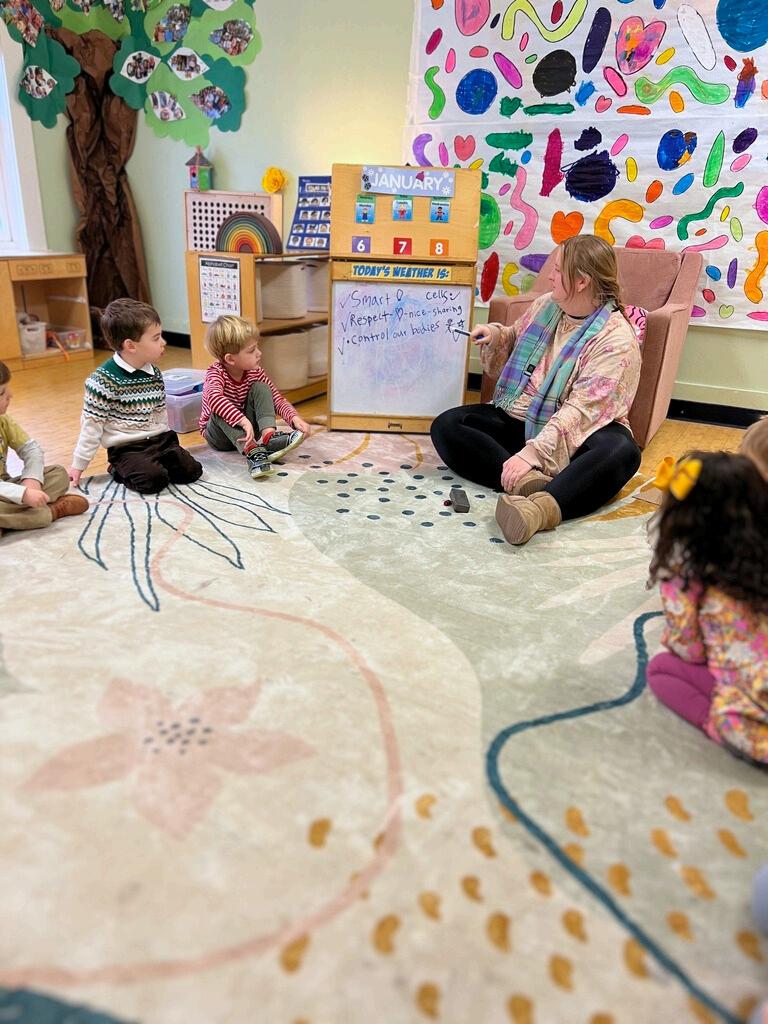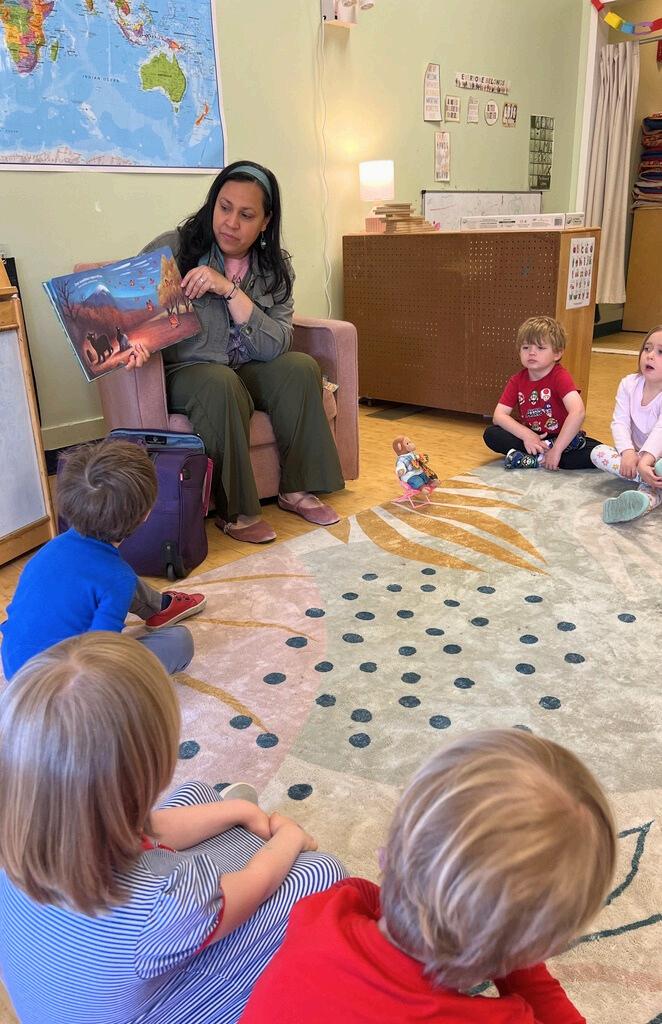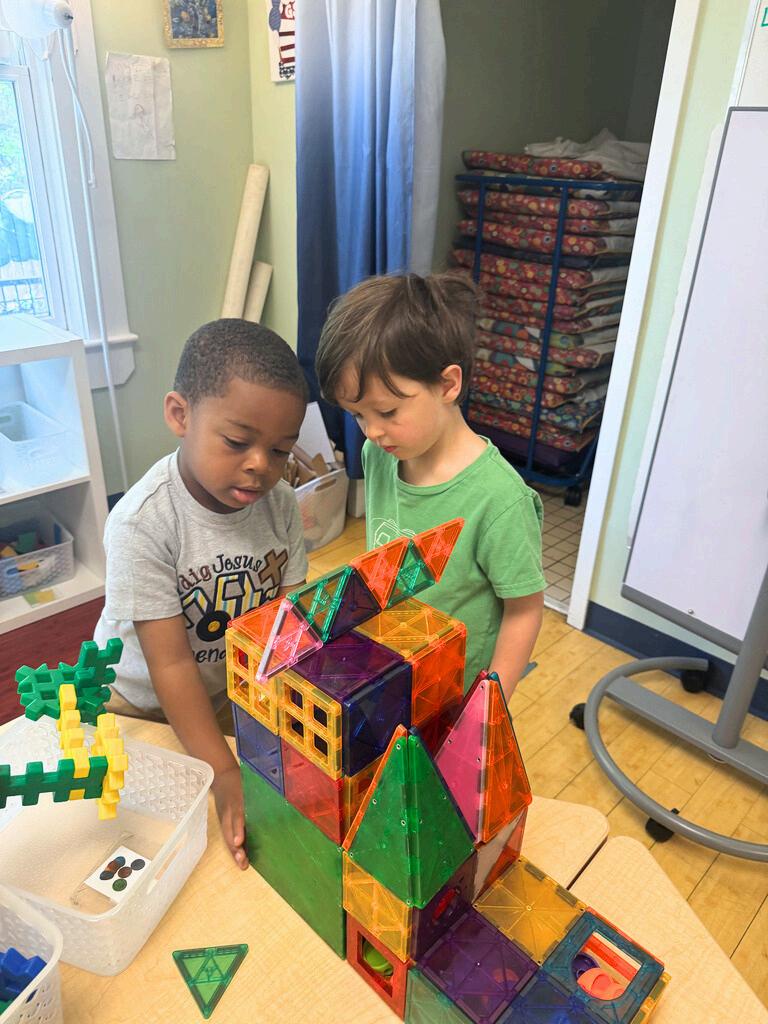PLAY
Play is the foundation of everything we do. Play and learning occur simultaneously—they are not separate entities. We believe that child-initiated play is also the foundation for healthy growth and learning in a range of areas, from gross and fine motor skills to the development of imagination, social skills, creative problem solving, and language development. This groundwork is laid unconsciously through play as future academics will be built on these play experiences.
Unstructured Play
Unstructured play is open-ended with no set goal and unlimited possibilities. Children engaged in unstructured play are in the process of establishing their own objectives:
Painting and drawing on blank paper
Dough/clay modeling and collage activities
Dramatic play and block construction
Sand and water play - sensory play
Imaginative and energetic outdoor play
Structured Play
Structured play has a specific goal and set of rules and objectives During structured play, children are seeking the most effective way to achieve preexisting objectives
Music and movement
Indoor games such as morning manipulative activities, matching, puzzles, tic tac toe
Outdoor games such as red light, green light, tag, etc.

MATHEMATICS
With the use of the Messy Maths resource, students will Investigate, use inquiry, and a hands-on, minds-on approach to understanding basic mathematical concepts. Our Tinker Lab/Maker Space is utilized to introduce STEM-based projects through hands-on, minds-on activities.
By the end of PK, students will be able to:
Numbers and Numeration
Recognize and learn numbers 1-10 and above
Rote count 1-20
Identify the number is one more or one fewer
Patterns and Function
Learn to create and extend AB patterns
Sort objects by size, type and kind
Explore and extend visual patterns
In addition, students will:
Begin to use and recognize place value and notation (name the ordinal positions in a sequence and “next” and “last” positions)
Identity patterns in the world around them
Recognize positional/directional concepts
Tinker Lab/Maker Space
Visit bi-weekly for intriguing, creative, collaborative activities around STEM
LANGUAGE, LITERACY, AND WRITING
Students are immersed in language and literacy through a richly integrated, multisensory approach. With a focus on children’s authors, students will enjoy listening to stories and learning about authors and rhymes to enhance their experiences.
By the end of PK, students will be able to: Print Concepts
Introduce and begin to recognize uppercase letters
Incorporate letters and words into their daily play through environmental print
Recognize and use environmental print
Manipulate a writing tool
Begin to form letters correctly by using the Handwriting Without Tears Program
Write their first name in uppercase letters
In addition, students will: Author Study
Be introduced to several different authors with a focus on the diversity of authors
Explore family, animals, nature, and socialemotional skills all through the magic of books
Create their books, signs, and notes around their favorite authors
SOCIAL STUDIES
Through the lens of our mission statement and the Formative Five, students investigate themes related to geography, history, cultural studies as well as current events. Introducing these concepts is critical to becoming intelligent and thoughtful participants in the community and the world.
By the end of PK, students will be able to: Formative Five
Understand the concepts of the Formative Five: Empathy, Grit, Integrity, Self-control and Embracing Diversity
Learns about each other's families and culture Holidays, Celebrations and Traditions
Participate in weekly chapel services
Share Information about the holidays / traditions celebrated by their own family
Discuss and learn about unique cultures and diversity in our GSL community
Through read-aloud, discuss and learn about cultures, holidays, and diversity from around the world
In addition, students will:
Begin to share and show understanding of at least one Formative five skill
SCIENCE/OUTDOOR CLASSROOM
Our outdoor space is a certified Natural Wildlife Habitat by Natural Wildlife Federation. The outdoor classroom offers many different areas that children can explore: garden beds, mud kitchen, log stools for meetings, dramatic play and arts, and a shaded pergola. During this time students have the opportunity to learn more about nature and the world around them.
By the end of PK, students will be able to:
Plants
Understand that seeds need soil, water, and light to grow into plants, flowers, or trees
Gardening
Experience planting flowers and vegetable seeds in the outdoor classroom
Animals
Understand that animals live in different habitats
In addition, students will:
Discuss, share and observe local weather and changing seasons
Use observation to describe patterns of what plants and animals (including humans) need to survive
Become aware of environmental needs through gardening and recycling
Experiment with liquids, solids and gas
Tinker Lab/Maker Space
Visit bi-weekly for intriguing, creative, collaborative activities around STEM
LIBRARY
Library classes are designed to introduce our youngest children to the school library and to foster a lifelong love of books and reading. Read alouds include songs, movement, puppets, and other means to create engagement and enthusiasm. Students are introduced to fiction, nonfiction, concept books, and wordless picture books. Through simple stories, rhyming texts, and interactive readings, students learn about the people and world around them GSL’s Formative Five traits and SEL skills are shared through quality, diverse book selections.
By the end of PK, students will be able to:
Demonstrate an understanding of how to hold and care for books
Recognize that books are read upright, from front to back and that there is a beginning, middle, and ending of stories
Follow directions when participating in class read aloud
Demonstrate a basic understanding of what authors and illustrators do
Demonstrate an awareness that print conveys a message
In addition, students will:
Be able to answer basic “who, what, when, where, why” questions about the stories
Try to predict events within a story
Make connections with characters, events, problems and solutions during our group discussions
SPANISH

For young children, acquiring a new language comes naturally. At this age, the brain is wired for learning new language skills. Children will explore the Spanish language through music, games, and stories
By the end of PK, students will be able to:
Identify basic shapes, primary colors, and numbers from 1-10
Identify the sound of a letter or character
Recite short songs and simple chants
State the names of familiar people with visual support
In addition, students will:
Be exposed to the rhythms and sounds of the Spanish language
Listen and respond to interactive ReadAlouds
learn about seasonal vocabulary, customs, and holidays from Hispanic culture
MUSIC AND MOVEMENT
Musik Adventures curricula engage the children in weekly activities that encourage multisensory learning, stimulating multiple areas of the brain at once We focus on different musical concepts throughout the year, introduce the students to different musical genres and styles that help foster a lifelong love and appreciation for music. And when young children are consistently engaged with music in an age-appropriate, socially accepting environment, developmental benefits multiply. We see an increase in selfesteem, ability to take turns, fine and gross motor skills, and literacy - just to name a few!
By the end of PK, students will be able to:
Singing and Vocal Development
Participate in singing songs with repeated words and rhythm
Movement
Act out musical stories through movement
Focused Listening
Identify a range of orchestra instruments and their sound quality
Hear patterns and rhymes
In addition, students will: Ensemble Experiences
Learn to participate in a small group of musicians playing at a certain time and learn how to keep a steady beat
Exploring and playing a variety of musical instruments
Learn to hold a mallet, hit a drum, use shakers, and play the xylophone and other instruments to help increase fine and gross motor skills

DISCOVER ME (MINDFUL EDUCATION)
Students thrive when they can understand and regulate their emotions. Discover ME stories, discussions, and activities teach children specific skills and strategies on what they can do to manage their own behavior. Discover ME is designed to teach children at an early age how to learn by focusing on essential skills that have a positive influence on learning: impulse-control, self-awareness, how to pay attention and listen, and how to focus, be present, and breathe with intention. These skills not only facilitate learning but encourage skills and strategies that equip children with the ability to take control of their own lives by CHOOSING positive words and actions. The Changemakers Curriculum is also used to help students understand how the brain functions, how to manage and control emotions, how to nurture strong relationships, and much more.
By the end of PK, students will:
Be introduced to mindfulness techniques (flower, candle, breathe and calm your glitter (feelings))
Begin to manage their own behaviors
Take responsibility for their actions
Stop and think about the consequences for what they choose to say and do
In addition, students will:
Make mindful choices
Resolve conflicts peacefully
